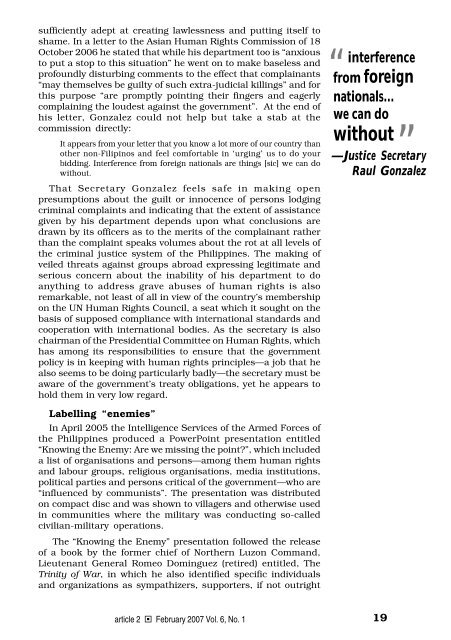of the Philippines the criminal justice system is - Article 2
of the Philippines the criminal justice system is - Article 2
of the Philippines the criminal justice system is - Article 2
Create successful ePaper yourself
Turn your PDF publications into a flip-book with our unique Google optimized e-Paper software.
sufficiently adept at creating lawlessness and putting itself to<br />
shame. In a letter to <strong>the</strong> Asian Human Rights Comm<strong>is</strong>sion <strong>of</strong> 18<br />
October 2006 he stated that while h<strong>is</strong> department too <strong>is</strong> “anxious<br />
to put a stop to th<strong>is</strong> situation” he went on to make baseless and<br />
pr<strong>of</strong>oundly d<strong>is</strong>turbing comments to <strong>the</strong> effect that complainants<br />
“may <strong>the</strong>mselves be guilty <strong>of</strong> such extra-judicial killings” and for<br />
th<strong>is</strong> purpose “are promptly pointing <strong>the</strong>ir fingers and eagerly<br />
complaining <strong>the</strong> loudest against <strong>the</strong> government”. At <strong>the</strong> end <strong>of</strong><br />
h<strong>is</strong> letter, Gonzalez could not help but take a stab at <strong>the</strong><br />
comm<strong>is</strong>sion directly:<br />
It appears from your letter that you know a lot more <strong>of</strong> our country than<br />
o<strong>the</strong>r non-Filipinos and feel comfortable in ‘urging’ us to do your<br />
bidding. Interference from foreign nationals are things [sic] we can do<br />
without.<br />
That Secretary Gonzalez feels safe in making open<br />
presumptions about <strong>the</strong> guilt or innocence <strong>of</strong> persons lodging<br />
<strong>criminal</strong> complaints and indicating that <strong>the</strong> extent <strong>of</strong> ass<strong>is</strong>tance<br />
given by h<strong>is</strong> department depends upon what conclusions are<br />
drawn by its <strong>of</strong>ficers as to <strong>the</strong> merits <strong>of</strong> <strong>the</strong> complainant ra<strong>the</strong>r<br />
than <strong>the</strong> complaint speaks volumes about <strong>the</strong> rot at all levels <strong>of</strong><br />
<strong>the</strong> <strong>criminal</strong> <strong>justice</strong> <strong>system</strong> <strong>of</strong> <strong>the</strong> <strong>Philippines</strong>. The making <strong>of</strong><br />
veiled threats against groups abroad expressing legitimate and<br />
serious concern about <strong>the</strong> inability <strong>of</strong> h<strong>is</strong> department to do<br />
anything to address grave abuses <strong>of</strong> human rights <strong>is</strong> also<br />
remarkable, not least <strong>of</strong> all in view <strong>of</strong> <strong>the</strong> country’s membership<br />
on <strong>the</strong> UN Human Rights Council, a seat which it sought on <strong>the</strong><br />
bas<strong>is</strong> <strong>of</strong> supposed compliance with international standards and<br />
cooperation with international bodies. As <strong>the</strong> secretary <strong>is</strong> also<br />
chairman <strong>of</strong> <strong>the</strong> Presidential Committee on Human Rights, which<br />
has among its responsibilities to ensure that <strong>the</strong> government<br />
policy <strong>is</strong> in keeping with human rights principles—a job that he<br />
also seems to be doing particularly badly—<strong>the</strong> secretary must be<br />
aware <strong>of</strong> <strong>the</strong> government’s treaty obligations, yet he appears to<br />
hold <strong>the</strong>m in very low regard.<br />
“<br />
interference<br />
from foreign<br />
nationals...<br />
we can do<br />
without....<br />
”<br />
—Justice Secretary<br />
Raul Gonzalez<br />
Labelling “enemies”<br />
In April 2005 <strong>the</strong> Intelligence Services <strong>of</strong> <strong>the</strong> Armed Forces <strong>of</strong><br />
<strong>the</strong> <strong>Philippines</strong> produced a PowerPoint presentation entitled<br />
“Knowing <strong>the</strong> Enemy: Are we m<strong>is</strong>sing <strong>the</strong> point?”, which included<br />
a l<strong>is</strong>t <strong>of</strong> organ<strong>is</strong>ations and persons—among <strong>the</strong>m human rights<br />
and labour groups, religious organ<strong>is</strong>ations, media institutions,<br />
political parties and persons critical <strong>of</strong> <strong>the</strong> government—who are<br />
“influenced by commun<strong>is</strong>ts”. The presentation was d<strong>is</strong>tributed<br />
on compact d<strong>is</strong>c and was shown to villagers and o<strong>the</strong>rw<strong>is</strong>e used<br />
in communities where <strong>the</strong> military was conducting so-called<br />
civilian-military operations.<br />
The “Knowing <strong>the</strong> Enemy” presentation followed <strong>the</strong> release<br />
<strong>of</strong> a book by <strong>the</strong> former chief <strong>of</strong> Nor<strong>the</strong>rn Luzon Command,<br />
Lieutenant General Romeo Dominguez (retired) entitled, The<br />
Trinity <strong>of</strong> War, in which he also identified specific individuals<br />
and organizations as sympathizers, supporters, if not outright<br />
article 2 • February 2007 Vol. 6, No. 1 19

















